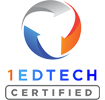It’s not every day that celebrity culture and high-stakes testing collide with the law, but now that it has, people can’t seem to get enough! Wealthy parents allegedly paid large sums of money to cheat the system and give their high schoolers a boost into highly selective colleges and universities. What can we learn from this? That even the most sophisticated proctored assessments can be corrupted, and students are not the usual suspects. For virtual schools struggling to ensure academic integrity, teachers play an essential role in defining and measuring student learning by using authentic assessment whether through synchronous activities, performance tasks, etc.
Corrupting an assessment system—or cheating on a high-stakes test—isn’t new. But it continues to surprise us when the adults, not the students, end up being the perpetrators. Unlike most students, adults have enough life experience to understand how some tests can make or break future opportunities. So why should one test stand in a child’s way? It shouldn’t, but as the former Chief Accountability Officer at a state education agency, I have seen firsthand how far adults will go to remove barriers created by low test scores.
In 2014, pressure was at a boiling point as we prepared to release state test scores and schools’ A-F letter grades. Many wondered, “Which online school would come out on top based on the new accountability model designed specifically for online schools?” On the other hand, the number of failing or “F” schools in the state was expected to hit an all-time high. Combing through more than a million test records for over 2,000 schools, the data showed something was not right. In the end, the state invalidated test results for hundreds of students across several schools (none of which were virtual FYI!).
No school contested the department’s findings, but more tellingly, no schools implicated students as the culprits. Unlike letter grades for their schools, students have much less motivation to cheat; ideally, their grades factor in multiple sources of information decreasing the burden of any one test or test type. So if kids aren’t to blame, why do we continue to be so concerned with the academic integrity of our online students?
Fully virtual schools have always faced skepticism about whether students’ online performance can be trusted. Critics question whether online students cheat their way through simply because they are not in a brick-and-mortar classroom. In response, virtual schools have incorporated plagiarism detection software, in-person proctored testing, virtual proctors, and other security enhancements. However, since most kids aren’t nearly as good at cheating as they’d like to think, most experienced educators have developed systems to identify and correct for academic integrity issues whether they’re in the virtual or physical classroom.
Having researched student performance at every level and medium, I feel confident that student disengagement remains a much bigger threat to digital learning than academic integrity could ever be. We must focus more on students who give up and walk away rather than those who find the answer on the Internet—a mitigated risk in any education setting. There will likely always be a fancy new app that solves Algebra II problems so students don’t have to!
Rather than trying to prevent inevitabilities, we can and should ensure that authentic assessment opportunities complement the use of technology-assisted cueing for students and computer-graded assessments for teachers. Performance on one test or one type of test should never be the sole criteria for defining student success. Indeed, that approach only further disengages learners and alienates parents. By engaging the disengaged with authentic assessment and meaningful feedback, we’re able to anticipate and offer our students and their families support before they turn somewhere nefarious for the answer—or even worse, turn away entirely.
 Yovhane Metcalfe, Ph.D., is StrongMind’s Vice President of Education Innovation overseeing the research and development of StrongMind’s award-winning digital learning solution.
Yovhane Metcalfe, Ph.D., is StrongMind’s Vice President of Education Innovation overseeing the research and development of StrongMind’s award-winning digital learning solution.
Learn how StrongMindTM is keeping students and their families engaged in the online classroom!
#onlinelearning #digitallearining @StrongMindEdu @yovhane






